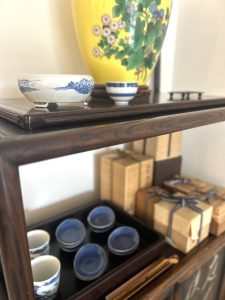連休中ではありますが本日は参院選の投開票日です(愛知県名古屋市千種区姫池通 骨董買取 古美術風光舎)
2025.07.20

本格的に夏到来といったところでしょうか。各地で海開きが行われ、学校も夏休みに入った地域が多く、この3連休はレジャー施設が賑わっているようです。そして三連休の中日となる本日は参議院議員通常選挙の投開票日でもあります。連休中日ということで投票率が下がるのではという懸念の声もありましたが、18日までに期日前投票を済ませた人は2145万人で、既に前回の参院選の期日前投票者数を上回り過去最多となっているようです。
それだけ今回の参院選への国民の関心が高いということでしょうか。
私も仕事帰りに投票所に行く予定ですが、あの静かにジーっと見られる感覚にはなかなか慣れず、いつも早く終わらせようとして慌てて雑な文字になってしまいます。もちろん厳重な監視が選挙には不可欠であることは言うまでもありませんが、ふと海外ではどんな雰囲気なのだろうという考えが頭をよぎりました。
まず、候補者の名前や政党名を記述する「自書式投票」を採用しているのは、先進国といわれる国の中では日本だけだそうです。ほとんどの国では、あらかじめ候補者名や政党名が記載された投票用紙にレ点や〇×などの記号を書き込む「記号式投票」を採用しているようです。自書式投票に比べ誤字脱字による無効票を減らすことができ開票作業も効率よく行うことができるという利点があります。前回の衆院選では誤字などにより全体の3%が無効票となったそうです。候補者名にひらがなが多いなぁと感じていましたが、無効票を防ぐという理由もあるのですね。そもそもひらがなの方が記入してもらいやすいという狙いもあるのだとか。
一方、記号式は投票用紙の準備に手間と時間がかかり、候補者が確定してからの作業が増えるなどのデメリットも挙げられ、さらに候補者が記載された順番によって有利不利が生じるのではとも考えられているようです。実はこれまで日本でも国政選挙において何度か記号式投票に移行しようという動きはあったようですが実現していません。
地方選挙では既に記号式に移行されているところもあり、青森県知事選挙では50年以上前から記号式が採用されています。文字を書くことが難しい人への配慮だということです。
識字率の高い日本においては、投票用紙に文字を書くことはほとんどの人にとって難しいことではないという認識がありますが、世界には識字率が50%以下の国もあります。文字の読み書きができない人のために政党名や候補者名を絵や記号で表し、チェックを入れる方式がとられています。
現在は変わっているかもしれませんが、アフリカのガンビアでは各候補者の写真が貼られたドラム缶にビー玉を入れるという方式がとられていました。ドラム缶にはビー玉を入れると鈴が鳴る仕掛けがあり、複数投票を防いだとか。自転車のベルの音と似ていたため、自転車で来ることは禁止されていたということです。
国が違えば投票方法も千差万別で、頭の中の当たり前が覆されます。また各国投票率を上げるために様々な試行錯誤を繰り返しているようです。驚異の投票率を誇るオーストラリアでは18歳以上の有権者は国政選挙の投票が義務化されており、正当な理由がなく投票しなかった場合は約2000円の罰金が科されます。また候補者に順位付けをする方式が採用されており、候補者の名前の横に1番から順番に順位を記入するのだとか。一人だけしか選ばないのは無効だそうです。なるほどと思いつつ、かなり考え込んでしまいそうです。
オランダでは「行きたくなる投票所」をモットーに投票所を設けています。アンネ・フランクの家や、ファン・ゴッホ美術館、ビールの醸造所や歴史的な教会など好みに合わせて好きな会場を選べるそうです。昔日本でも選挙の日は家族のお出かけ日を兼ねていたと聞きますが、せっかくだから出かけてみようかと言う気持ちにはなりそうです。
16歳で選挙権が与えられるドイツでは、子どもが政治に関心を持つように、35年前から公共放送局が世界情勢や政治問題をとりあげた子供向けのテレビ番組を放送し人気だそうです。学校や家庭で政治の話題が白熱するのは自然なことなのだとか。思い起こすと我が家で真剣に政治について話し合ったことなどあったでしょうか…。
子供の頃からの教育が大切なのかもしれませんが、幼いが故の怖さも感じてしまいます。
それでは、また次の機会に。(スタッフH)
Summer has officially arrived. Many places have opened their doors to the public and schools are closed for the summer holidays, so leisure facilities seem to be crowded during the three-day weekend. Today, the middle day of the three-day weekend, is the day of the regular House of Councillors election. Although there were concerns that voter turnout might drop because it is the middle day of a three-day weekend, 2.145 million people had already cast their ballots by the 18th, surpassing the number of people who cast their ballots before the deadline in the previous House of Councillors election, which is the highest number ever.
This is the highest number ever, surpassing the number of people who voted before the deadline in the previous Upper House election.
I am planning to go to the polling place on my way home from work, but it is difficult to get used to the feeling of being stared at silently, and I always end up with messy letters in my haste to finish early. Needless to say, strict surveillance is essential for elections, but I suddenly wondered what the atmosphere would be like overseas.
First of all, it seems that Japan is the only country in the developed world that uses a “write-in ballot,” in which the candidate’s name and the name of the political party are written down. Most countries seem to adopt the “symbolic ballot,” in which a mark or a cross is written on the ballot paper with the name of a candidate or a political party written in advance. Compared to the “self-written ballot,” this method has the advantage of reducing the number of invalid votes due to typographical errors and omissions, and of making the vote counting process more efficient. In the last lower house election, 3% of all votes were invalid due to typographical errors. I have noticed that many candidate names are written in hiragana, but I understand that there is another reason for this: to prevent invalid votes. Hiragana is also said to make it easier for voters to fill out the ballot.
On the other hand, the symbolic ballot system has some disadvantages, such as the time and effort required to prepare the ballots and the additional work required after the candidates are decided. In fact, there have been several attempts to switch to symbolic voting in national elections in Japan, but they have not been realized.
Some local elections have already switched to symbolic voting, and the Aomori Prefectural Governor’s Election has been using symbolic voting for over 50 years. The Aomori Prefectural Governor’s Election has been using symbols for more than 50 years. This is because of the consideration for people who have difficulty writing letters.
In Japan, where the literacy rate is high, there is a perception that it is not difficult for most people to write letters on the ballot, but there are countries in the world where the literacy rate is less than 50%. For those who cannot read or write, the names of political parties and candidates are represented by pictures or symbols, and a check mark is placed on the ballot.
In Gambia, a country in Africa, marbles were placed in drums with each candidate’s picture on them. The drum had a mechanism that rang a bell when the marbles were placed in the drum to prevent people from voting for more than one candidate. Because the sound was similar to that of a bicycle bell, it was forbidden to ride a bicycle to the polls.
Different countries have different ways of voting, and this overturns the norm in one’s mind. It also seems that each country is trying various ways to increase voter turnout. In Australia, which boasts an astonishing voter turnout rate, voting in national elections is compulsory for all voters over 18 years of age, and a fine of approximately 2,000 yen is imposed on those who do not vote without a valid reason. They also use a system of ranking the candidates, with the order of the candidates being written next to their names, starting with number one. They say it is invalid to choose only one person. I see what you mean, but it seems to make me think about it quite a bit.
In the Netherlands, the motto “a polling place you will want to go to” is the motto of the polling place. They can choose their favorite venue, such as Anne Frank’s house, Van Gogh Museum, a beer brewery, or a historical church, depending on their preferences. I hear that in the past in Japan, election day also served as a day for family outings, so it seems like a good idea to go out since you’re going to the trouble.
In Germany, where children are given the right to vote at the age of 16, for the past 35 years public broadcasters have been broadcasting popular children’s TV programs on world affairs and political issues in order to encourage children to take an interest in politics. It is natural for the topic of politics to become heated at school and at home. Thinking back, I wonder if we ever seriously discussed politics at home….
Perhaps education from childhood is important, but I also feel the fear of being too young.
I hope to see you again next time. (Staff H)
*******************
ご実家の整理やお片付けなどをされている方のご相談などが多くございます。
お片付けなどくれぐれもご無理のないようになさってくださいませ。
風光舎では古美術品や骨董品の他にも絵画や宝石、趣味のお品など様々なジャンルのものを買受しております。
お片付けをされていて、こういうものでもいいのかしらと迷われているものでも、どうぞお気軽にご相談下さいませ。
また風光舎は、出張買取も強化しております。ご近所はもちろん、愛知県内、岐阜県、三重県その他の県へも出張いたします。
まずは、お電話お待ちしております。
愛知県名古屋市千種区姫池通
骨董 買取【古美術 風光舎 名古屋店】
TEL052(734)8444
10:00-18:00 OPEN

